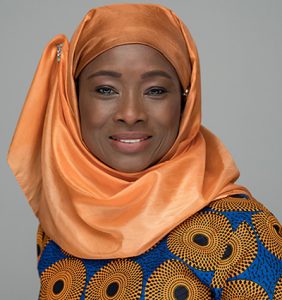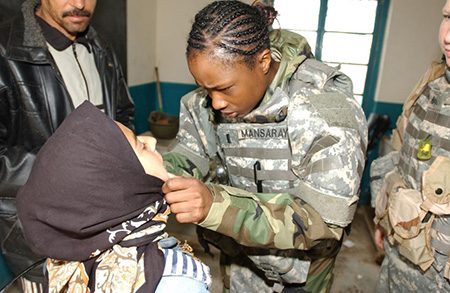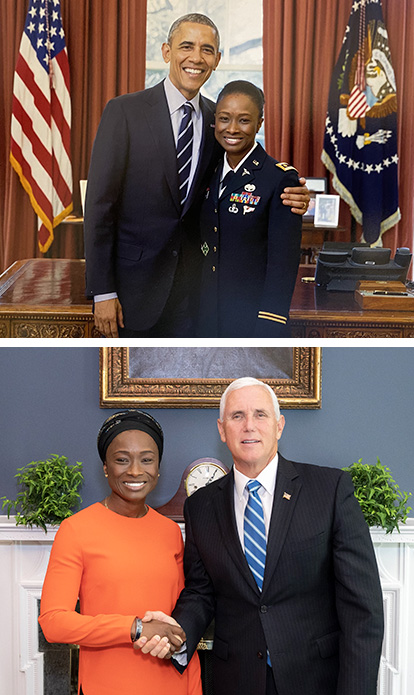PA Saibatu Mansaray Thrives in High-Pressure Situations
From Iraq to the White House, She’s Detail-Oriented and Tactical
By Dave Andrews
August 25, 2023

Since immigrating to the United States from Sierra Leone nearly three decades ago, Saibatu Mansaray, PA-C, has cultivated an illustrious career serving in the military, leading humanitarian missions, and even working in the White House. Yet despite her long list of honors and accolades, she never forgot where she came from.
Her motivation to move to the United States was less about creating a better life for herself, and more about finding ways to improve the lives of others. By the time she was a teenager, she had already witnessed numerous friends and family members in Sierra Leone struggle with—and sometimes die from—health issues that would have been more easily treated in a developed country with better access to care.
“Not only is the healthcare system in Sierra Leone beyond poor, the empowerment of youth and educational opportunities there are very minimal,” Mansaray said. “From a very young age, I wanted to be in the medical field because I felt that was the best way for me to make a difference.”
At age 19—just six months after moving to the U.S.—she enlisted in the Army and began taking night classes. She soon met the requirements to attend PA school and by 2005, she had graduated and become a commissioned officer and PA in the military.
[Wherever you want to go in your career, AAPA can help – join or renew your membership today]

High-Pressure Comfort Zone
Throughout her two deployments to Iraq, she served approximately 30 humanitarian missions to some of the hardest-hit areas that had little-to-no access to healthcare. The seemingly endless lines of patients, she said, would typically go out her clinic door and wrap around the building. Though exhausting, the work was exactly what Mansaray sought out to do.
Ultimately, Mansaray’s clinical and tactical expertise led her to the top: For several years she served on the White House Medical Unit, planning and executing comprehensive medical contingency plans for the president and vice president for each trip they would take domestically or internationally. And while her duties demanded the highest levels of strategy and detailed communication, Mansaray always felt right at home.
“In the White House, just like in Iraq, she was in her comfort zone,” said Kevin O’Connor, DO, who supervised Mansaray as a fellow member of the White House Medical Unit. “She thrives in those types of high-pressure, tactical roles because she’s not only incredibly detailed oriented, but also very direct. From the moment she begins to speak, you can just tell she knows what she’s doing.”

Earned Respect
O’Connor, who now serves as director of executive medicine for the GW Medical Faculty Associates, says the inherent trust and respect Mansaray has earned among her colleagues and superiors largely come from her unique experiences as a PA in the military.
“[Military PAs] are usually more senior relative to other providers in the military, so they’re the mentors for the newer physicians regarding operational medicine,” O’Connor said. “PAs will always command the respect from the line which is hard for an attending physician to replicate, especially one who is just entering the military. The smart physicians will pick up on that early on. My most effective mentors in the 22 years I was in the Army were all PAs.”
Mansaray officially retired from the Army in 2017 after nearly 23 years of service, and she recently resigned from her latest position at the White House as senior executive and assistant director for public health. But she says her work to improve the lives of others has only just begun.
The Next Mission
She recently established the Mansaray Foundation and is preparing to relocate back to Sierra Leone where her foundation will focus on addressing the country’s high rate of maternal mortality. While acknowledging the task is daunting, Mansaray is confident that significant improvements are possible with the right strategy and people in place.
“Sierra Leone lacks sufficient healthcare infrastructure, so a large focus of ours will be finding and developing opportunities to improve service delivery systems, and then increasing not only the number of available providers, but also the level of quality care.”
Her initial plans include partnering with local transportation services that will help bring more women to their prenatal visits, as well as deliver more medicine and better equipment to rural and underserved areas.
[PA Founds Company to Help New Parents Build Perfect ‘Nest’]
Sierra Leone also lacks a consistent, continuing education program for its providers post graduation. So to help them stay up to date, Mansaray plans to establish virtual and in-person training programs to recertify providers.
So far, many of the providers the Mansaray Foundation is collaborating with come from other African nations such as Senegal, Benin and Nigeria which suffer from similarly high rates of maternal mortality. “By collaborating with others in the field,” Mansaray said, “we have a much higher likelihood of conquering this problem.
“Simply put, this is about promoting a long life,” she said. “A little girl deserves to feel safe, to dream and to have female role models in her community. That isn’t often the case in Sierra Leone, and I want to help make that a reality for the next generation of young girls.”
Dave Andrews is a freelance writer based in Northern Virginia. Contact him at [email protected].
Editor’s Note: This article originally appeared on November 16, 2020
You May Also Like
PA Dedicated to Helping Survivors of Sexual Assault and Human Trafficking
Servicemember Called to the PA Profession: William Eisenhart
PA Founds Company to Help New Parents Build Perfect ‘Nest’
Thank you for reading AAPA’s News Central
You have 2 articles left this month. Create a free account to read more stories, or become a member for more access to exclusive benefits! Already have an account? Log in.




